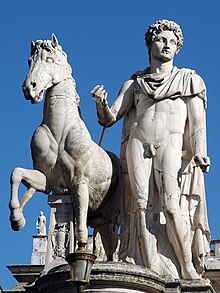|
Castor và Pollux  Trong thần thoại Hy Lạp và thần thoại La Mã, Castor[1] và Pollux[2] hoặc Polydeuces[3] là hai anh em sinh đôi, được gọi chung là Dioskouri hoặc Dioskouroi.[4] Mẹ của họ là Leda, nhưng Castor là con trai phàm nhân của Tyndareus, vua của Sparta, và Pollux là con trai của thần Zeus, người quyến rũ Leda dưới vỏ bọc của một con thiên nga. Mặc dù cách hai người sinh ra được mô tả rất đa dạng, như họ được cho là đã được sinh ra từ một quả trứng, cùng với chị em song sinh cùng mẹ khác cha là hai nàng Helen và Clytemnestra. Trong tiếng Latin cặp song sinh cũng được biết đến như là Gemini[5] hoặc Castores.[6] Khi Castor bị giết, Pollux nhờ Zeus cho phép Castor chia sẻ sự bất tử của mình để giữ hai anh em lại với nhau, và họ đã được chuyển thành chòm sao Gemini. Cặp song sinh được coi là thần bảo trợ của các thủy thủ, người mà họ xuất hiện như Lửa thánh Elmo, và họ cũng được liên hệ với việc cưỡi và đua ngựa. Đôi khi hai anh em cũng được gọi là Tyndaridae hoặc Tyndarids,[7] ám chí họ là con của cha/cha dượng Tyndareus. Chú thíchTham khảo
Sách tham khảo
Liên kết ngoài
|